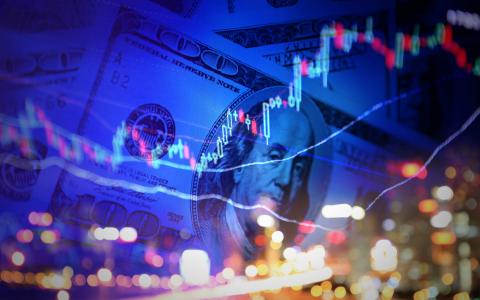
(Reuters) US blue chip companies that have been racking up record debt to fund strategic acquisitions and share buybacks could face higher borrowing costs as they are vulnerable to being downgraded to junk status in the next economic slump.
Loans to US corporations that are rated in the BBB or Baa categories, the lowest levels on the investment-grade rung, now account for about half of the high-grade sector, up from a third a decade ago, after this debt spree. The amount of debt that US corporate borrowers are carrying on their balance sheets is at an all-time high, according to rating agency S&P.
“While credit conditions are very good, leverage is high and will only go higher in a stressed environment. We may see more fallen angels in the next downturn, meaning low investment grade companies moving to non-investment grade,” said Mariarosa Verde, senior credit officer at rating agency Moody’s Investors Service.
Fallen angels are investment-grade companies that sink to speculative grade, or junk, ratings that raise the cost of borrowing due to higher default and credit risk.
Among US non-financial companies, 31% of BBB debt is now leveraged at or above 4.0 times earnings before interest, tax, depreciation and amortization because of high debt growth, Morgan Stanley analysts wrote. Median leverage for these investment-grade rated companies is 2.55 times, compared with 1.98 times for A-rated borrowers.
Although several large companies including global brewer Anheuser-Busch InBev and GE are currently on the watchlist, a crush of ratings cuts to speculative-grade rankings is unlikely in the near term, analysts, investors and bankers said.
The decade-long economic rebound still has room to run, and US companies are generally in a better position after tax reform cut rates made it easier to access overseas cash.
Drawn spreads on US BBB-rated investment grade loans averaged 121.4bp over Libor in the third quarter, the lowest since 120bp in the second quarter of 2016, and sharply below the peak of 293.75bp in the second quarter of 2009, according to LPC data.
Most loans for highly rated companies are revolving credits which are undrawn. Undrawn US loans averaged 15.14bp in the third quarter, and have held in a narrow band for several years.
BBB CAUTIOUS
Several acquisitive investment-grade companies have not deleveraged as promised, leaving banks with more exposure than anticipated in low-priced acquisition loans.
Anheuser-Busch InBev came under fire after Moody’s threatened to lower its A3 rating by up to two notches unless it can provide a credible plan to reduce leverage more quickly after its SABMiller acquisition.
That follows the shock downgrade of Ford in late August when Moody’s cut the carmaker’s rating by one notch to Baa3, the lowest investment grade ranking. S&P also cut GE’s rating by two rungs to BBB+.
“We’re watching these large BBB complexes very, very closely to ensure that their objectives around deleveraging are being met,” said a senior banker, referring to recent debt-backed mega mergers including telecommunications giant AT&T with media company Time Warner and drugstore chain CVS with health insurer Aetna.
Some investors cannot buy leveraged loans or bonds from highly indebted companies, which carry more repayment risk. Investors that can hold that paper will be calling for increased returns as compensation.
“My concern is less about a big wave of downgrades, and it’s more that in the shorter run you could see credit spreads widen out a little bit because of the level of supply from BBBs,” the banker said.
“But overall there’s a fair amount of optimism about the economy, where banks and credit investors feel like the cycle still has some time to run, and I’m not hearing a level of concern that would persuade underwriters from not underwriting new business.”
Sub-investment grade markets have shown that they are able to absorb massive supply, even for issuers with aggressive borrower-friendly terms on their debt.
Fallen angel Teva Pharmaceutical, which loaded up on loans and bonds as an investment-grade company for its US$40.5bn acquisition of Allergan Generics in July 2015, tapped the junk market for the first time in March with a bigger-than-expected US$4.5bn-equivalent deal. Based on strong investor demand, Israel’s Teva was able to lower yields from initial price talk on its high-yield bond debut, IFR reported.
“We are not overly concerned that in a recession the BBB downgrades will overwhelm the high-yield market,” said David Brown, co-head of global investment grade at Neuberger Berman.
SELF CONTROL
A shift in the make-up of BBB credits could mitigate downgrade fallout, however, as the economic cycle plays out.
In the last economic downturn, BBB-rated companies were highly cyclical, and as a result cash flows sank for sectors including autos, metals and mining, chemicals and energy, said Brown.
“Now the BBB sector is dominated by companies with a high amount of leverage but they are economically defensive - pharmaceutical and healthcare, telecom, midstream, cable and food and beverage,” he said. “These sectors are characterized by high levels of free cash flow and low levels of economic cyclicality.”
Ongoing economic growth in the US and the low corporate tax rates are also helping moderate concern about mass downgrades.
“We’ve had a meaningful stimulus that is bearing fruit. We are seeing good profit growth and still have very strong liquidity, which are supporting and sustaining corporate credit quality,” Verde said.
Determining to use available cash to step up debt repayment could help companies to avoid falling into junk status. Companies could also choose to reduce their debt with asset sales of non-core divisions.
“It’s possible now that interest rates are rising that they may devote more cash flow to debt reduction rather than shareholder initiatives,” said Verde. “At the investment-grade level companies are, to a large extent, masters of their own destinies in that they have the capacity to reduce leverage.”



